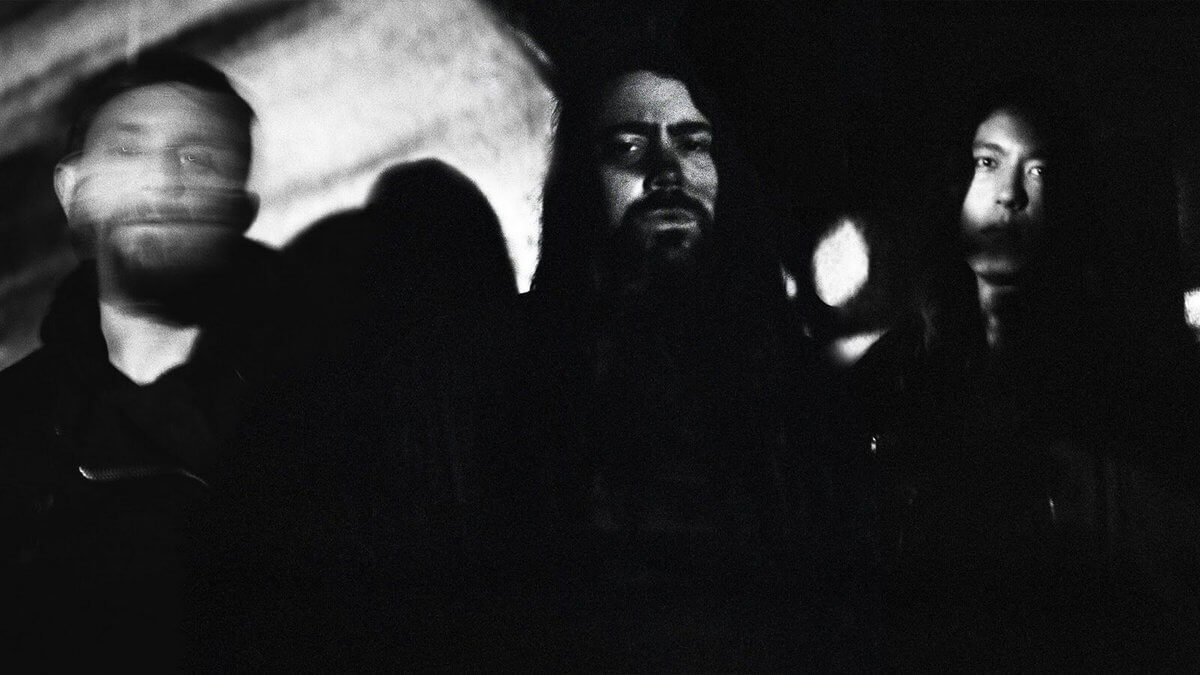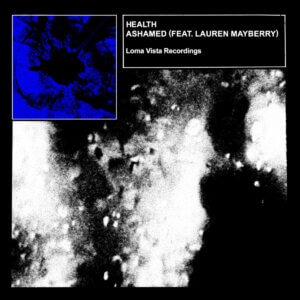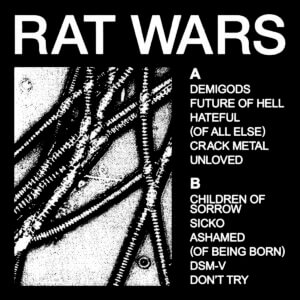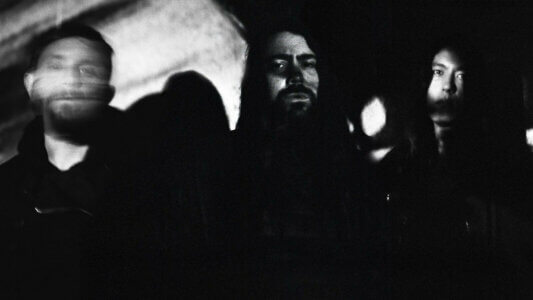Health Stay True To Their Creative Roots

Not every band could pull off collaborations with Soccer Mommy, JPEGMafia, XIU XIU and Nine Inch Nails, but Los Angeles-based industrial noise trio, HEALTH aren’t your typical band. Their music is cinematic in its sonic vastness, providing luminous spaces to lose oneself in, and grounded by immensely vulnerable lyricism delivered with great care and sensitivity by vocalist Jake Duzsik.
It’s music to get lost in whilst finding your voice or place – purpose, even – in the world. On “Ashamed”, a recent single and early insight into their latest material, to a subdued arrangement the chorus reverberates with the protagonist’s pain: “I’m ashamed of being born.” The weight of loneliness conveyed in the song becomes almost suffocating and difficult to shake with the arrival of another haunting admission, “I know I’m too young to die / But I’m old enough now / With no one in this world.” And yet, within HEALTH’s forthcoming fifth studio album RAT WARS, there are moments of euphoria which effectively uplift the darker components of the work. The potency of those instances transforms feelings of debilitating solitude into an offering of solidarity.
Traveling in a car, en route to a family vacation, HEALTH’s bassist and electronics maestro John Famiglietti spoke to Northern Transmissions about the making of RAT WARS and how the fans were always at the forefront throughout its inception. Along the way, the conversations veered towards a variety of topics from the role of collaboration, the influence of film on their work and Famiglietti’s favorite memories from the last two decades of HEALTH.
Northern Transmissions: Hey, John! How are you today? Where are you traveling to?
John Famiglietti: I’m good but it’s poor timing for me because I have this album coming out and I’m about to get on a cruise ship! it’s with my family and my mom was not going to let me get out of this, it’s very important. We’re going to Cabo San Lucas.
NT: That sounds lovely.
JF: Personally, I fucking hate cruises and hate being on the boat. But, I know that I’ll have a great time!
NT: Well, have fun! Congratulations on Rat Wars. I’ve been really enjoying listening to it. There’s a nice balance of intensity mixed with euphoria and also vulnerability. How was the writing and recording process?
JF: You know, it wasn’t that different from other records we’ve made. I think that our mental space, with this record, was made more from a place of, and this might sound silly, confidence and strength. I think with previous HEALTH records, we’ve always been like, ‘Is this our last record? Are we done?’ With this one, though, while we were making it, it just felt really good. It felt like we were making it for our fans. I guess that was different and it was during a very prolific time with us doing those two collaborative records back-to-back and working all through the pandemic, we really sharpened our songwriter skills. We’re so much more comfortable and faster and prolific at it now, I think.
NT: You mentioned there that with each other album, you felt it could be the last one. Did this one feel more inspiring as you were making it and created a strong atmosphere in the studio?
JF: Yeah, basically. Also, it was like, ‘Hey, the fans are going to love this. This is going to be great’. It was just a different thing. Our earlier records, you know, we’re very proud of and we love them, but when we were making them we were like, ‘Who is this for?’ With our music we’ve had a kind of strange road, but what we’re doing right now feels great and we feel like we’ve really found our fans, as well.
NT: With HEALTH, your music is so vast and infectious in terms of the melodic structures and the tones and textures conjure such a strong misty, nocturnal setting. It’s very visually stimulating and striking music. When you’re in the studio, creating the songs and getting to know them and their worlds what is that feeling like?
JF: We kind of do it in broad strokes. As we’re doing it, we’ll be like ‘Okay, that’s good’ or ‘We’ll make that sound cool later’ or ‘That will work, it just sounds terrible right now but we’ll fix it’. And so, we just keep revisiting things until it’s good and there’s a path to make everything right. Now we’re confident enough that we can, I mean, in the past we used to panic, but now, we’ve done this enough times that we’re aware that we’re self-confident to know we can get the sound we want. So, we can think in more broad strokes of the song structure or figuring out what’s catchy or a good vocal.
NT: Is it hard to switch-off from that way of thinking and developing ideas after a day’s work in the studio?
JF: Oh, no it’s very easy, I hate working! I’ll go right home and do whatever bullshit, you know. It’s really easy and it doesn’t even weigh on me at all! What we like to do with these records is take a long time making them; not that we’re working for so long but there are huge breaks between stuff. If you finish something, it’s really amazing to come back in four months and then jump back on the song again. To have the time where you listen to it a bajillion times, when you’re hanging out and you get ideas or hear certain things that aren’t working. Time is definitely a huge thing and important in the process.
NT: I suppose that’s nice as well to have that time for your relationship to evolve with the songs.You go from the very early period of making it to being in the pocket with it and then comes the excitement of knowing fans will get to hear the work and then share it with audiences in a live setting.
JF: Definitely. Or just, with having that time and evolution with something, sometimes you get that random idea or a moment of inspiration to want to try different things out. That can be really great, too.
NT: Something I enjoy across HEALTH’s music, especially on first listens, is to pay close attention to Jake’s vocals because the contrast between his voice and the intensity of the music is so striking to hear. I always think his presence in the songs has such an effortless quality of drawing the listener further into the work. For you, what is it like when you hear some of the lyrics for the first time during the recording process because what he sings is so open.
JF: The funny thing is that when the band first started, we couldn’t really even hear Jake because we were this loud band playing together in a room. So, later when we’d do a record we’d be like, ‘Ah, that’s your singing!’ Over time, the band has grown into more of a lyrical thing and that’s Jake’s department. If we really hate something, I’ll say something. Most of the time, we’re like ‘That’s cool’ or he’ll run stuff by us and ask for our opinion.
NT: Your music has been a huge source of support to your fanbase when they go through difficult periods. We hear that in Jake’s lyrics and even your merch carries messages to serve as reminders of hope to help get through challenging times. Do you remember the first album that made an impact on you in that you felt understood by the artist or articulated how you felt in the world?
JF: For me, I didn’t really care about music until I heard the Dead Kennedys.That’s when I started to really get into music. It wasn’t so much about the lyrics, it was this aggression in the music that I really got off on. That’s always been one of the main things with music for me, I’ve always loved music that makes me feel in a very physical way. Obviously, there are great lyrics that I’ve identified with, but for me, it’s always been about that juice. That’s different for other people, of course.
NT: At gigs and with social media making connections between fans and artists more accessible, I can only imagine that you have a line of interaction with fans?
JF: I think it’s fair to say that there’s no other artist in the entire music biz who has more fan interaction than me. I’m the most available man in rock and roll! You can call me anytime. We give out my phone number, you can talk to me in Discord everyday, you can meet me at the show for free and everyone does. We’ll take a photo, I’ll sign whatever you want. I am there, so yeah, no one is beating me on that!
NT: You must enjoy it!
JF: Yeah, I do. A lot of people hate it and they have social anxiety, which I understand. But, it doesn’t really bother me. I always looked up to Joe Strummer, he was just hanging out with fans until like 4 a.m. every night after they’d play some massive show. Now, I’m not gonna do that, but I will say hi to you.
NT: You mentioned the collaborations albums earlier. What do you enjoy most about collaborating and what have been some of the most important things you’ve learned either about how you create individually or as a band from your previous experiences?
JF: For us, it’s pretty liberating, it’s actually more fun because you can’t control the situation if someone else is there. And a lot of times it’s remote, so you have to go with whatever. So, that really helps us loosen-up about music. Also, you get to see like, you know, how everyone has their own inclinations of how they write music or what they respond to. I think, a lot of the time when you’re making music, you can do something kind of the same every time, so it’s really fun then to work with someone else who’s really different. They bring their bag of tricks and you just have to work with it. A lot of the collaborations, on my end, are like a big math problem. It’s a production equation that I’m trying to solve where it’s like, ‘Okay, can we imagine how this is going to work and how we’re gonna put this together?’ When we have that, then we can go with it.
NT: There’s always an extraordinary cinematic quality to the way HEALTH creates worlds and builds atmosphere in songs. With Rat Wars, the songs “Unloved” and the gorgeous closer “Don’t Try” made me think og David Lynch’s work, specifically Twin Peaks. “Don’t Try” reminded me of that heartbreaking scene in Fire Walk With Me where Laura Palmer encounters the angel. It’s a really beautiful and affecting piece of music, there’s also something so holistic about the synths in it. It just really stands out for its tonal shift and the combination of loneliness it captures in the music and your performance. Can you tell me about the development of that song and perhaps the mood you wanted to capture?
JF: I love that movie, I love that ending.. That was a song that Jake brought into the studio pretty much fully-written. It was pretty together and we sort of talked about it, talked about the lyrics a little bit. He had this demo of just him playing guitar and I really liked that but there was no room for it on the album so I kind of begged him to stick them together for the intro. We only got a little bit of it, I wanted an extension of it. But actually, I think it worked out the way we did it. We didn’t want to go too damn long because the song’s already long as it is. So it worked out and then I did the outro and a production pass. The whole thing, by the end, when it all came together sounded really cool.
NT: It’s such a beautiful piece of music, I really enjoyed that song every time it came on. Will you be playing it live on your upcoming tour?
JF: Ugh… maybe? Hopefully! I think what we’re going to do is branch out for the people who come to repeat shows. We feel guilty if we play the same set every night. So, for the first time ever, we’re going to try to vary the sets, within reason. Maybe we’ll do a thing where we can cycle some songs and play something like “Don’t Try”. We’re always kind of afraid to play the really mellow songs because we want people to dance and have fun at the shows. Like I said, we might do a thing where we can cycle a song into a slot in the set to mix it up. The other funny thing with “Don’t Try” is that it’s really all Jake, I play some keyboard on it, so it’s really up to him if we play it. Maybe we could try a different version of the song live!
NT: I saw in your merch that there’s a HEALTH hat using the Heat font. How important or inspirational have films or film soundtracks been in your personal and the band’s approach and appreciation of music and conjuring a particular mood in songs?
JF: I mean music that’s about emotion, we’re really inclined toward cinematic stuff and we just really like it. There’s a sort of vague science fiction or dystopian thing throughout our music from the beginning. Our early albums have a sort of a primitive Mad Max thing going on and things got a bit more cyber-punk and now we’re I guess we’re in grim dark territory. There’s always been a cinematic or sci-fi element to the music, not in a corny way, there aren’t any sci-fi lyrics or anything, but that feeling is present.
NT: Yeah, absolutely. The music is really transportative. Finally, it’s coming up to 20 years of HEALTH in 2025. Can you describe what the experience of being in the band has meant to you and share a favorite experience from the last 20 years with the band?
JF: It’s kind of like a weird Déjà vu. We like, ‘How much time has it been? Oh my God!’ We’ve been driving, on tour again, crossing the United States. We’ve criss-crossed the United States God knows how many times. Maybe 14 times or so. It’s like you’re in this weird purgatory of this loop of your life but it’s great! It’s a good lifestyle and obviously we’ve had great moments. We just had a recent one which was our show at Roadburn festival. That was really transcendent. You know, you don’t think you’d have those moments so long into doing what we’re doing. There was also, the first and the second time we played Primavera Sound. They’re all totally magical moments. They’re death-bed memories! Yeah, we’ve had a lot of great times together.
Pre-order Rat Wars by HEALTH HERE
Latest Reviews
Tracks
Advertisement
Looking for something new to listen to?
Sign up to our all-new newsletter for top-notch reviews, news, videos and playlists.









